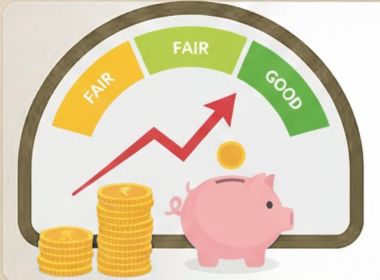Search Suggestions
- Gold Loan
- Money Transfer
- Mutual Funds

Why Credit Appraisal Matters Before Loan Approval
Every loan process or even credit card application begins long before an approved message flashes on your screen. What appears to be a straightforward transaction is supported by a careful scrutiny of the borrower’s financial footprint. This is known as a credit appraisal or the lender’s way of understanding how safe it is to lend money to the borrower in simple terms. The evaluation process examines the borrower’s income, current obligations, financial consistency and credit history to form a complete understanding of the repayment capacity.
Table of Content
- What is Credit Appraisal?
- Why Does Credit Appraisal Matters?
- Credit Appraisal Process
- Final decision and loan terms
A central part of this entire process is the CIBIL score, which reflects how well the borrower has handled credit in the past. From the lender’s perspective, a CIBIL score is a signal of financial discipline more than just a number. A high score helps the borrower access credit on better terms, while a lower score may prompt more stringent checks. At its core, credit appraisal ensures that lending is responsible, structured and aligned with the borrower’s financial realities.
What is Credit Appraisal?
Before approving any amount, it is the lender’s internal method of gauging the borrower’s financial viability, aimed at minimising the risk of loan defaults. More than a checklist, a credit appraisal is the framework through which financial institutions, such as banks and NBFCs, determine the reliability of a loan request. From personal loans to corporate loans and credit card sanctions, every lending decision is shaped by this underlying process.
While it is often associated with numbers and documentation, the essence of the credit appraisal process goes a little deeper. It is the intersection of financial history, income patterns, existing liabilities and the overall risk profile of the applicant. The goal of the entire evaluation process is to ensure that the loan being considered is sustainable for both the borrower and the lender.
Lenders use credit appraisal scores to approve or disapprove applications and decide on loan amounts, interest rates, tenure and other conditions related to the loan. The meaning of credit appraisal points to a balancing tool where responsible lending meets responsible borrowing, helping avoid defaults while providing borrowers with access to the right kind of credit whenever they need it.
Why Does Credit Appraisal Matters?
Lending without due evaluation of the borrower’s creditworthiness is like steering without a compass. Hence, credit appraisal brings structure to that decision.
Here is why credit appraisal matters:
Prevents overborrowing
By assessing income, liabilities and expenses, lenders are in a better position to ensure borrowers do not take on more than they can realistically repay.
Reduces default risk
A detailed credit appraisal helps lenders identify repayment risks early, allowing them to act cautiously before disbursing funds.
Encourages financial discipline
Knowing that loan approval depends on the financial background motivates borrowers to improve their creditworthiness and build strong credit habits.
Promotes fair and objective decisions
Credit appraisal eliminates guesswork from the process with data, ensuring every application is judged on merit instead of assumptions or surface-level impressions.
Influences loan terms
The outcome of appraisal directly impacts the loan amount, interest rate, repayment tenure and even the need for collateral.
Credit Appraisal Process
Every approved loan or credit card stands on the foundation of a systematic credit appraisal process. While specifics may vary from lender to lender, the core steps mentioned below follow a clear structure designed to ensure responsible lending.
Application review
This is the parameter wherein the lenders delve into the details shared by the borrower in the loan application. The parameters are employment history, income, address and loan requirement. This evaluation process gives lenders an initial sense of the borrower’s financial landscape.
Document verification
Once the application passes the initial review, the submitted documents, such as bank statements, salary slips, IT returns, ID proofs and address verification, are checked thoroughly for accuracy and consistency.
Credit score check
After evaluating the submitted documents, the applicant’s CIBIL score is pulled from credit bureaus to understand past repayment behaviour, outstanding loans and the overall credit profile.
Assessment of repayment capacity
Income-to-obligation ratio, monthly cash flow and employment stability are assessed in the next step to determine the applicant’s ability to repay the loan amount without any obligations or strain.
Risk profiling
Based on professional judgment, industrial volatility, age and financial habits of the applicant, lenders evaluate how likely the applicant is to repay the loan amount on time.
Final decision and loan terms
After combining all findings, the lender decides on loan approval, amount, tenure, interest rate and other applicable factors.
In conclusion, credit appraisal is a safeguard for the lender and borrower more than a formality, shaping the outcome of every loan request. For those seeking simple eligibility requirements and quick loan approvals, Muthoot Finance stands out as a trustworthy lender. With expert evaluation and personalised support, you can take informed steps toward your financial goals and ultimately work to boost CIBIL score along the way.
- Instant Personal Loan
- EMI Calculator
- Document Required
- Track Personal Loan
- Interest Rate
- Procedure and Eligibility
CATEGORIES
OUR SERVICES
-

Credit Score
-

Gold Loan
-

Personal Loan
-

Cibil Score
-

Vehicle Loan
-

Small Business Loan
-

Money Transfer
-

Insurance
-

Mutual Funds
-

SME Loan
-

Corporate Loan
-

NCD
-

PAN Card
-

NPS
-

Custom Offers
-

Digital & Cashless
-

Milligram Rewards
-

Bank Mapping
-

Housing Finance
-

#Big Business Loan
-

#Gold Loan Mela
-

#Kholiye Khushiyon Ki Tijori
-

#Gold Loan At Home
-

#Sunherisoch
RECENT POSTS

Understanding KDM Gold and Why it’s Banned
Know More
Gold loan boom: 3,000 new branches to open in India in 12 months
Know More
Gold Loan Boom: Rs 14.5 lakh crore market spurs NBFCs to add 3,000 branches
Know More
How BNPL Affects Your Credit Score
Know More
Inside the Muthoot money machine: How a Kerala family turned gold loans into a billion-dollar empire
Know More
Billionaire Family Turns India’s Gold Obsession Into a Fortune
Know More
What is a Cheque and its Different Types in India?
Know More
Benefits of Paying Your EMIs on Time: Why Timely Payments Matter
Know More
A Complete Guide to Report Online Fraud
Know More
How does a Personal Loan Affect your Credit Score?
Know MoreFIN SHORTS

What Are Co-Pay and Deductibles in Insurance Policies?
Know More
Should You Take a Loan Against Your Mutual Fund or SIP?
Know More
Top 5 Best Mid-Cap Mutual Funds to Watch in 2026
Know More
Are Personal Loans Right for Retirees? Key Points to Consider
Know More
What Happens to a Personal Loan After the Borrower Dies?
Know More
Best Loan Choices for Credit Scores of 580 and Below
Know More
7 Reasons Why a Gold Loan Is the Best Option for Small Businesses
Know More
10 Reasons Why People in India Prefer Physical Gold
Know More
Real Estate vs Gold: Which Is a Better Investment in India?
Know More
10 Common Mistakes That Make Investors Lose Money in Mutual Funds
Know More
10 Reasons Why Gold Has So Much Appeal in Uncertain Times
Know More
7 Ways Settling Debt Can Impact Your CIBIL Score
Know More- South +91 99469 01212
- North 1800 313 1212


